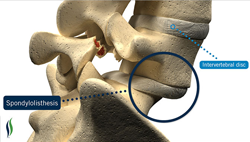Treat Spondylolisthesis at MidAmerica’s Palos Hills & Mokena Locations

Spondylolisthesis is a condition in which a bone in the back, called a “vertebra,” slides forward over the bone below it. This condition, Treatable at MidAmerica’s Palos Hills and Mokena clinics, most often occurs in the lumbar spine, or lower back, and can result in nerve root damage leading to back pain, numbness, weakness in the legs, or in some rare cases, loss of control over bladder and bowels. Occasionally, this condition may exhibit no symptoms at all.
Causes
Bones in the spinal column come together at several small joints that keep them in line while still allowing for movement. Spondylolisthesis can be caused by a number of issues with the small joints in the back including:
- Joint damage from an accident or other trauma
- Joint damage from arthritis or an infection
- A congenital joint condition (since birth)
- Joint damage from a stress fracture
This condition can occur at a variety of ages for different reasons. Children and teens may experience Spondylolisthesis from a sports-related injury or stress fracture, while adults often develop this condition due to natural degeneration of vertebrae over time. (WebMD)
Symptoms
Spondylolisthesis may exhibit no symptoms after initial outset, or may occur years later after the condition has taken hold. Common symptoms include:
- Pain running from the lower back through the legs
- Difficulty walking (limping)
- Numbness or weakness in one or both legs
- Back, leg, or buttock pain that is exacerbated by bending or twisting
- Loss of bladder or bowel control (in rare cases)
![xray]() Diagnosis
Diagnosis
If Spondylolisthesis is suspected, a physician will examine X-rays of the back, looking for signs of vertebral fractures or if any have slipped out of place. An MRI or CT scan may also be used to pinpoint the site of the injury and to help inform treatment.
Treatment
A physician will recommend that a patient with Spondylolisthesis stops all physical activity that may have caused vertebrae damage. To help with pain in the short term, nonsteroidal anti-inflammatory drugs (NSAIDs) such as ibuprofen or naproxen may be prescribed. Additionally, a physical therapy routine may be recommended to strengthen back and stomach muscles. If a patient is overweight, weight loss may help alleviate symptoms.
In severe cases, when vertebrae continue to move despite physical therapy treatment, or if there is significant damage to nerve roots, surgery is also an option. A spinal fusion surgery may be performed to reposition and stabilize a slipped vertebra, thereby lifting the bone off a nerve root or the spinal cord. Alternatively, a procedure may be performed removing errant bone tissue to alleviate pressure on the spinal cord. Oftentimes both procedures are performed during the same surgery. (Spine-Health)
Recovery
Spinal surgery patients are usually hospitalized for anywhere from one to five days. Patients may need to wear a cast or back brace, and will be advised to limit their physical activity. Six to 12 weeks after surgery, the patient will undergo a variety of stabilization exercises to develop core strength, along with hamstring stretches to increase functionality. Patients may resume normal activity three to six months after the procedure, when the spinal fusion is set.
For specialized treatment, turn to MidAmerica's Palos Hills and Mokena clinics. We specialize in minimally invasive spine surgery (MISS).
MISS can help reduce tissue trauma, postoperative pain, and recovery time. While some post-surgery pain is to be expected, advancements in pain management and post-surgery physical therapy make it easier than ever to manage discomfort.
To learn more about MidAmerica’s Palos Hills and Mokena clinics and the different treatment options available to you, visit our website.
To schedule an appointment with MidAmerica Orthopaedics, call (708) 237-7200. We also serve Chicago, Oak Lawn, Orland Park and New Lenox.

 Diagnosis
Diagnosis